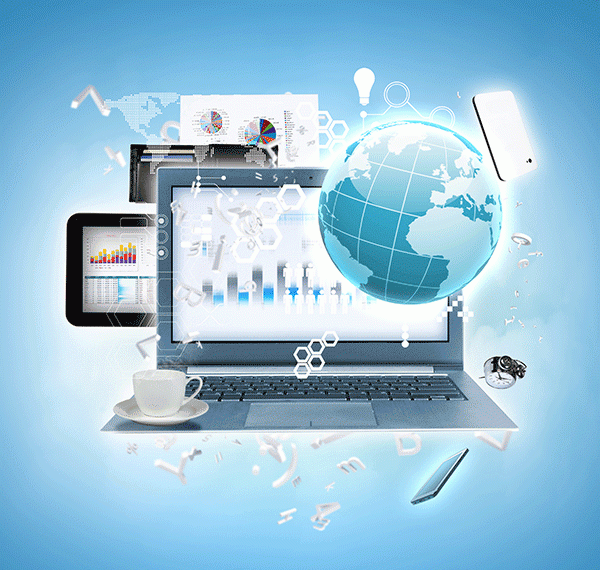Table of Contents
- How to develop digital knowledge?
- Digital skills
- A technological vision: Cloud computing
- Internet of Things (IoT) as a digital competence
- Business strategies in the face of cybersecurity skills shortages
- What are professionals doing to stay up to date?
- What digital skills are essential for professionals in the energy sector?
- Conclusions
- References
The shortage of digital skills and internal barriers related to business culture and mindset are identified as the main drawbacks hindering digital progress in the energy sector. Digital skills development is therefore necessary for the industry to remain competitive and promote sustainable trade within the energy sector.
Digital communication competency involves the ability to use digital tools and platforms effectively and fluidly, both in synchronous and asynchronous interactions. This allows professionals to actively participate in online conversations, contributing relevant contributions and promoting efficiency in communication in virtual environments.
In business terms, this competence facilitates understanding of the market and consumers, increases internal productivity and strengthens brand identity through effective online communication.
Information management involves the ability to search, obtain, evaluate, organize and share information in digital environments. A competent professional in this area is able to efficiently navigate the Internet to access valuable information, resources and services. Likewise, you can perform effective web searches to obtain relevant data, in real time and from any location.
The ability to function both professionally and personally in the digital economy implies mastering effective digital tools and understanding the hypertextuality and multimodality of new digital media. A competent professional in this area can increase productivity, accelerate innovation and change the way ingenuity and processes are managed in a company.
How to develop digital knowledge?
The ability to network involves the ability to collaborate on shared processes and objectives using digital media, produce collaborative documents online, and communicate effectively with the work team through digital media.
This can help optimize the circulation of information and understanding among workers, improve process efficiency, and foster creativity and innovation in the company.
The development of digital skills is essential for any profession, given the completely digitalized environment in which we find ourselves. Mastering these tools is highly beneficial, since the use of the latest technologies can boost job opportunities.
Staying constantly trained is key to acquiring and honing these digital skills, ensuring you stay on top of developments. In this sense, there are various platforms that offer continuous training opportunities for those seeking to constantly improve their digital skills.
Digital skills
Digital skills are those knowledge and skills that allow the use of technological tools. This knowledge is necessary to interact fluently with the developments involved in the current digital transformation, both of companies and of society in general.
In the workplace, these skills are very necessary since they allow the safe use of all technologies and tools to achieve the objectives defined by companies.
Digital transformation is a highly disruptive phenomenon in the current century, where technology constantly advances and influences all aspects of our lives. This period has been called the era of “accelerated change” by experts, and the workplace is where a significant impact has been observed due to the explosive growth of technological advances.
Companies that fail to keep up with this digital transformation find themselves at a disadvantage, in a race to the finish line, and inevitably need to catch up.
To avoid obstacles to innovation, smart organizations will look for candidates who possess digital skills that are highly in demand today.
This means that both employees who want to future-proof their careers and employers who want to retain their top talent must prioritize upskilling, reskilling and adopting cross-cutting digital skills.

A technological vision: Cloud computing
Cloud computing is a paradigm that makes computer system resources, such as storage, applications, processing power, networks, and web hosting, available to users on an on-demand basis.
This flexibility allows users to “connect” to these services as they need, at any time and from anywhere in the world.
In the current job market, with employers in the technology sector actively seeking experts in this field, cloud computing has become a crucial component of the digital transformation strategy.
Businesses are increasingly adopting cloud-based solutions to meet their needs, offering benefits such as lower costs, fast response times, and the cost-effective ability to scale.
Internet of Things (IoT) as a digital competence
The concept of the Internet of Things (IoT) refers to the interconnection of everyday objects, equipped with technology, that use the Internet to communicate, connect and share data.
By early 2024, the number of electronic devices used daily by humans is projected to exceed 29 billion, reflecting rapid advancement in electronics, manufacturing and information technologies, as well as the growing trend toward digitalization. Worldwide.
In this context, technology employers are looking for professionals with up-to-date knowledge of the latest products, underlying technologies and their application to drive business success.
Business strategies in the face of cybersecurity skills shortages
Faced with a lack of cybersecurity skills, companies are implementing training programs to fill this gap, while at the same time turning to security services to counteract the lack of talent in this area.
Additionally, numerous organizations are using threat intelligence to mitigate cyber risks, prioritizing risk assessment and adopting best practices in security management.
Similarly, some companies are carrying out penetration tests as a proactive measure against cyber threats, due to the shortage of trained cybersecurity professionals. The role of digital skills in companies.
The energy industry, while experiencing complete disruption, is no different from other global sectors that are taking advantage of progress in business performance, especially through the application of automation, digitalization, big data analytics and artificial intelligence.

What are professionals doing to stay up to date?
With technology, innovation, the transition to a less carbon-dependent future and new business models, new technical skills are becoming part of the necessary skill set. The industry needs a flexible, multi-skilled and technology-savvy workforce.
Most of the current workforce will remain in the industry in the next 10 years. Therefore, it is important to upskill existing talent to perform tasks more efficiently.
A special emphasis will be placed on training in data-related competencies, business skills, new work arrangements and other specialized technological skills.
Some of these specialized technical skills include artificial intelligence, robotics, materials science, cybersecurity, remote operations, and blockchain development. Although many companies will invest in the training of their staff, it will be the responsibility of the worker, consultant or contractor in the sector to take the initiative in developing their own capabilities.
In today’s environment, characterized by its accelerated pace and constant change, digital skills have acquired unprecedented relevance in the modern workplace.
Mastering one or two computer programs is no longer enough to survive in most jobs; employers are requiring workers to be tech-savvy and proficient in a variety of digital tools and platforms.
The ability to effectively use digital technologies has become an essential requirement for all employees, regardless of their role or sector of work. However, digital competencies are not only important at an individual level, they also influence the overall success of an organization.
The ability to leverage digital technologies to communicate, collaborate, and analyze data can have a significant impact on a company’s productivity and competitiveness. This is especially relevant for those organizations adopting a remote work approach.
Digital tools and platforms enable employees to work remotely, facilitating effective communication with colleagues and clients around the world, as well as instant access to information and resources.
What digital skills are essential for professionals in the energy sector?
The energy industry is undergoing a significant digital transformation, with the widespread deployment of sensors, smart grids, and the integration of renewable energy and distributed energy resources (DER) that make use of artificial intelligence (AI) and machine learning (ML).
Demand for digital skills, including data science, big data analytics, networking, cloud computing and software analytics, is on the rise, and energy companies require professionals capable of driving innovation and continuous learning in a Digital environment.
As technology and new working methods have revolutionized other key industries, energy sector leaders have embraced emerging technology in the hope that it will lead to a more productive future for the industry as a whole.
However, such major changes raise fundamental questions, especially for energy professionals, who need to stay up-to-date. As a specialist workforce adapts to an ever-evolving environment, understanding technology and new working methods is no longer simply desirable, but an imperative need.
Conclusions
The accelerated evolution of technology today is an undeniable fact. To stay current and relevant in any field of expertise, it is imperative to stay up to date with technological advancements, especially in the realm of technology.
The vast majority of daily decisions and activities are closely linked to technology, which leads us to reflect on the digital skills necessary to develop, depending on the performance area of each individual.
It is crucial to understand the importance of digital competencies, since the professional and personal environment requires skills for efficient information management, regardless of the field of specialization.
Digital tools have become fundamental elements in our daily lives, whether to keep up to date with the news or to communicate with family and friends, even over long distances.
In today’s job market, the most in-demand digital skills include data analytics, artificial intelligence and machine learning, cloud computing, cybersecurity, and digital marketing. These skills are highly valued by energy sector employers as they drive innovation, productivity and success in the digital age.
References
www.elev8me.com/insights/cybersecurity.
https://www.aicad.es/competencias-digitales-
https://digital-skills-jobs.europa.eu/en/community

